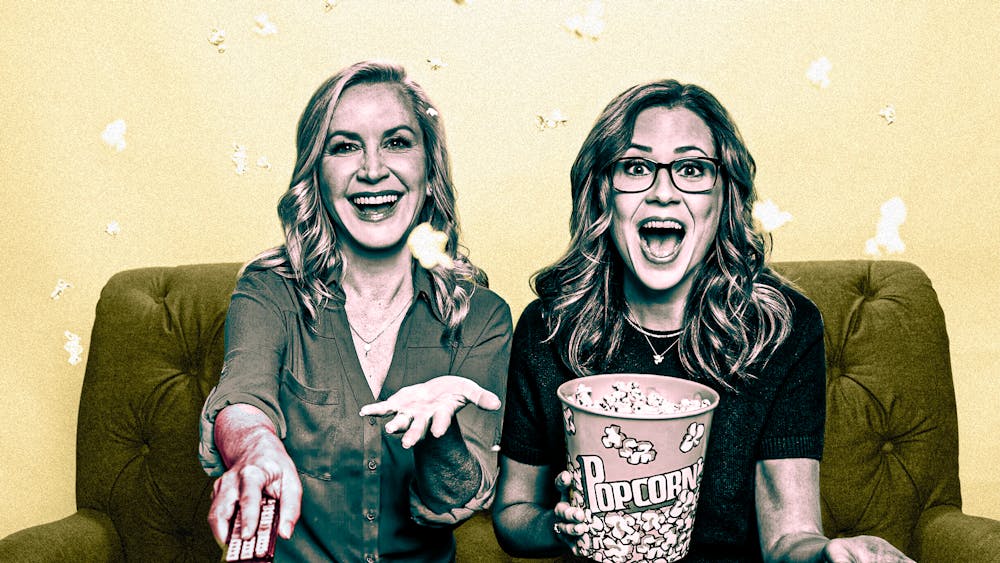There used to be a standard method of viewing television. You’d pick up the remote, turn on the TV, pick a channel, and voila! You’re watching television. It was simple and nice and required minimal thinking. Today, the formula is not so simple. There is watching the show, looking at what people on the Internet are saying about the show, and then, listening to a podcast about it.
In the last decade, perhaps no two mediums have experienced as much growth and popularity as television and podcasts. While it has always been popular, television has recently (arguably) usurped film as a dominant cultural force, and podcasting has transformed from a nagging app on iPhones to an essential form of media that has ingrained itself in many people’s everyday lives. A Forbes article this year reported that “Nearly 80% of Americans over the age of 12 are now aware of podcasts—up more than 30% from a decade ago,” a staggering level of industry growth in such a short period of time. Podcasts have swallowed up space in nearly every genre — sports, comedy, true crime, history, and film and television.
Naturally, the two mediums have figured out effective and profitable ways to coalesce. Specifically, in two ways: the network–sponsored recap show, and the cast member rewatch podcast.
HBO has committed itself to the recap podcast, with nearly all of its current original shows having accompanying podcasts. There seems to be no discrimination in which ones get a podcast—it’s not simply an “Emmy play” for shows like Succession (whose podcast was hosted by respected journalist Kara Swisher) and House of the Dragon, as there are also recap pods for And Just Like That, the critically…reviewed Sex and the City reboot, and Sam Levinson’s ill–fated The Idol. It appears to be a now expected, routine part of HBO’s productions.
HBO’s commitment to their recap podcasts has been noticed in the industry. An article from The Verge revealed that “a survey conducted by HBO Max found that 85 percent of those who listened to a program’s official podcast felt more connected to the show,” proving that the podcasts are effective for HBO’s brand, helping to foster more invested and devoted fan bases for their programming.
The reasons for the recap podcast are varying. For one, a network like HBO can utilize their network–sanctioned podcasts to allow the actors and creatives behind the show to break down their creative processes, which is a perfect, controlled environment for Emmy campaigning. It also creates sound clips that can be put online and build social hype for the shows. It’s a fairly foolproof way to increase viewer intrigue without having to do outsourced marketing.
The other side of the new television–podcast marriage is the cast member “rewatch” podcast. This genre’s popularity can perhaps be traced to the Office Ladies podcast, started by Jenna Fischer and Angela Kinsey, who starred on The Office together. In the boom of The Office gaining a new generation of fans on Netflix (similar to shows like Friends and Gilmore Girls), Fischer and Kinsey decided to create a podcast recapping every episode of the nine–season comedy.
The podcast has been extremely successful, and sparked a string of other rewatch pods, or, as Leon Wu coined the phenomenon in 2019, “franchise podcasting.” Wu goes on to explain why podcasts are appealing: “Podcasts can be recorded in real time with minimal editing and don’t require much cast and crew. This removes the financial and logistical burden that causes so many production companies to shut down traditional tv shows.” For producers and talent alike, podcasts are a great way to create profitable content without the headaches involved with film and television production.
The rewatch podcast has now seen many iterations, including Welcome to the OC, Bitches!, with The O.C. stars Rachel Bilson and Melinda Clarke; Fake Doctors, Real Friends with Scrubs stars Zach Braff and Donald Faison; And That’s What You REALLY Missed with Glee stars Kevin McHale and Jenna Ushkowitz; Drama Queens with One Tree Hill stars Hilarie Burton, Sophia Bush, and Bethany Joy Lenz, and countless others. This is no slight to the actors involved; however, it is notable that there is no Friends rewatch podcast with Jennifer Aniston, nor a Michelle Williams–led Dawson’s Creek pod. These podcasts are a way for these actors to revisit the peak of their careers, and thanks to built–in audiences, they almost all succeed.
The podcast space is still so new and burgeoning, and perhaps the recap and rewatch podcasts will someday be remembered as a flash in the pan fad. The market for rewatch podcasts in particular seems to be already oversaturating itself, and soon, people will have to pick how many of their beloved old shows they are willing to invest in revisiting weekly. For now, however, it’s a field with zero losers, and is a fascinating window into our culture’s current obsession with nostalgia — the need to revisit what we used to love, why we loved it, and why nothing new can compare.

